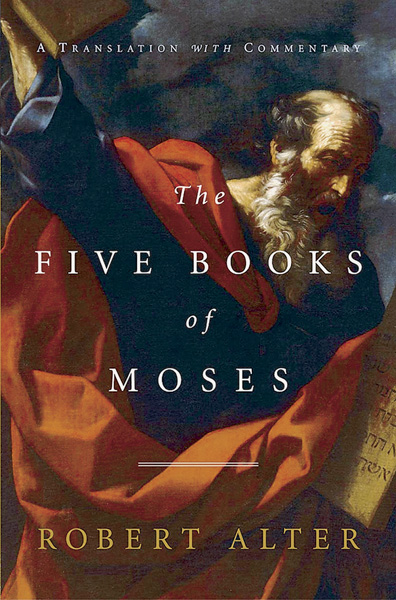Bible Books

The Five Books of Moses
Translation and Commentary by Robert Alter
New York: W.W. Norton & Co., 2004

“
To measure its enduring impact, it is sufficient to consult the list of new editions of the Bible in English. Robert Alter’s is the most recent. Let me say it at the outset: This is a masterpiece of clarity, erudition and synthesis. Professor of Hebrew and Comparative Literature, author of many works on ancient and modern Jewish texts, Alter uses his talent as a literary critic to inspire in the reader a passion for studying the text.
His introduction is remarkably compact. It summarizes in a few pages everything one must know about the hazards inherent in translation and how to avoid them. Every time he mentions his disagreement with the classic, much celebrated King James translation, one wants to applaud.
An example: When the servant of Abraham, Hagar, tries to avoid seeing her son Ishmael on the point of dying of thirst in the desert, the biblical text says “
Here and there some of Alter’s conclusions may disturb the fiercely Orthodox—for whom, for example, the Five Books, dictated by God to Moses, could only have had one author and not several. They will also not appreciate the emphasis he places on the allegorical aspect of certain meta-historical events. Alter is not afraid of displeasing or shocking by admitting at times that the definition or translation of a term remains obscure. If the great Jewish commentator Rashi can permit himself to say, in certain places, that he does not know the solution to a problem, Alter can too. But in general, one can neither deny nor diminish the fine quality of his exegetical gift. Besides, does he not constantly cite Talmudic sources, Rashi, the Tosafists and Abraham Ibn Ezra? After reading this volume, the reader no longer knows what he should admire the most: the limpid beauty of his style, at once poetic and evocative, the richness of his knowledge or the felicitous turn of phrase?
As soon as Alter runs into a difficulty—the apparently gratuitous repetition of a word, the ambiguity of the word Zera, the subsurface references to the sexually forbidden, the nuances of the term kad, a grammatical deviation, words with double meanings, the importance of the Vav participle for the rhythm of the poetic phrase, the significance of modulation in the Biblical verse—all this he approaches with intelligence and elegance. Nothing discourages him or frightens him. The mystery of the Akeda (the binding of Isaac), the suffering of Jacob and Joseph, Tamar’s need for justice, the solitude and frustrations of Moses discovering the Golden Calf—the author recalls what others have said on these themes before revealing his own thinking.
Conclusion?
More than everything else that Robert Alter has written—on a variety of subjects, in contemporary literature as well as biblical studies—this work abounds in stimulating thinking and eloquent writing. He honors those whom he invites not just to follow him but to accompany him.
Translated from French by Michael Shurkin.
